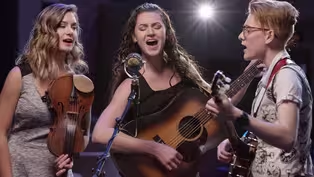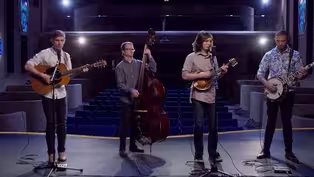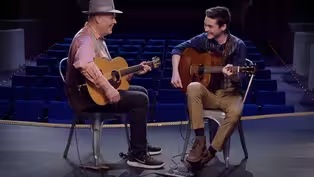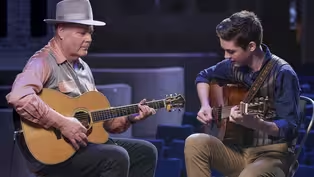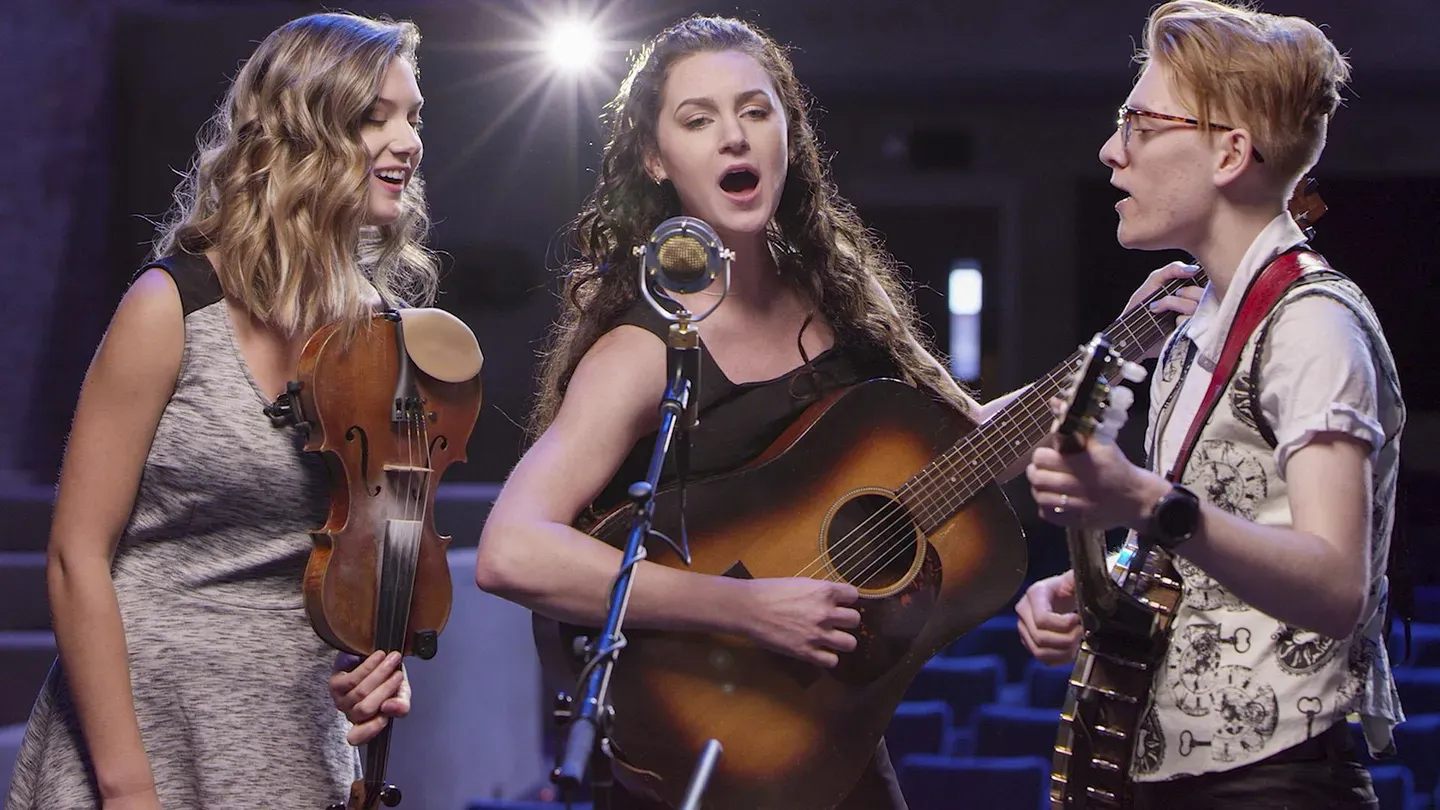

Rising Stars
Season 4 Episode 4 | 24m 42sVideo has Closed Captions
David visits with rising young stars of roots music at an historic theater in Elkin, NC.
Meet the future of roots music: Presley Barker, the Burnett Sisters, Willow Dillon, and Cane Mill Road. David shares tunes and stories with these rising stars of new acoustic music who were raised on traditional tunes in the shadow of old masters.
Problems playing video? | Closed Captioning Feedback
Problems playing video? | Closed Captioning Feedback

Rising Stars
Season 4 Episode 4 | 24m 42sVideo has Closed Captions
Meet the future of roots music: Presley Barker, the Burnett Sisters, Willow Dillon, and Cane Mill Road. David shares tunes and stories with these rising stars of new acoustic music who were raised on traditional tunes in the shadow of old masters.
Problems playing video? | Closed Captioning Feedback
How to Watch David Holt's State of Music
David Holt's State of Music is available to stream on pbs.org and the free PBS App, available on iPhone, Apple TV, Android TV, Android smartphones, Amazon Fire TV, Amazon Fire Tablet, Roku, Samsung Smart TV, and Vizio.
Buy Now
Providing Support for PBS.org
Learn Moreabout PBS online sponsorship(bluegrass music) - We're here in Elkin, North Carolina at the historic Reeves Theater.
It's an old theater, and we're here to tape some very talented and very young performers.
- [Narrator] Members of the Cane Mill Road band drive the mountain back roads between Deep Gap, North Carolina and Rocky Gap, Virginia to meet and make music together.
They grew up on traditional bluegrass standards, but their original music straddles the lines between bluegrass, Americana, old-time, and folk.
Kathleen and Anissa Burnett often make music with their two younger sisters, but they also play in the band Strictly Strings with Willow Dillon, who moved from Hawaii to Watagua County as a kid and traded the ukulele for banjo, mandolin, fiddle, and guitar.
Presley Barker won the guitar competition at the Galax Fiddler's Convention when he was just ten years-old.
He studied with guitar masters, such as Wayne Henderson, Bryan Sutton, and Steve Lewis, and he just keeps getting better.
- Presley, it's great to have you here.
- Well, thank you, David, it's my pleasure to be here and a huge honor for me.
- I think I've known you since you were about 10, how old are you now?
- Well, I'm 14-years-old now.
(laughs) - That's so amazing.
You've had some fabulous teachers.
- Mhmm, Wayne Henderson, been a huge influence, and also Mr. Bryan Sutton helped me a ton, and Ricky Skaggs also helped me a lot in my music.
- And who's been your biggest mentor would you say?
- Well, I'd say they've all been huge ones, but Wayne Henderson's really helped me a ton and has built me guitars and has taught me his songs and, you know, I've got to play a lot shows with him, and it's been so great, and Steve has helped me so much too for picking and, you know, everything.
Bryan's also been there.
- Of course a fabulous player who's been on this show.
- He sure is, yes.
- You know, I noticed you played a lot like Doc.
Did that influence you a great deal?
Doc Watson's one of my greatest influences, and I love his music, and certainly, that's been a huge influence on my picking.
- You know, his picking was so clear and so melodic and thoughtful, every solo sorta said something, but it was powerful that was the amazing, he was so powerful.
And I noticed that you're playing the way that he did.
Rarely do I see a musician do this and that is playing from your elbow all the way down to the pick on your finger there, and most people are working more from their wrist.
But, like, just show us kinda how you do it.
- Oh, yeah.
(slow cord strum) I've never been able to actually anchor my hands down here like a lot of pickers do.
(slow cord strum) And I've always, you know, I can... (bluegrass music) I've always been all here in the arms.
- If you can control those muscles then you really have a lot power there, don't you?
- That's right, it really helps out in a situation where you can't be heard enough and you can't get enough power so you can always try to pulL through.
- Well, let's play one of those old tunes, the Black Mountain Rag.
- Oh, gosh, I'd love to do that with you, David.
(bluegrass music) - Well, you're a young person who's gonna see this music into the far future.
How do you feel like it's changing, can you tell?
- Well, one thing I really hope is with all the young people need to carry on the tradition, I guess, of this music and not let it die out.
I think everybody's trying to come up with their own things and new songs and new ways to play the old songs, and it's really great that they're adding their own touch, I guess you could say, to the songs and add their own ideas.
- I'm assuming you're gonna be a professional musician, or you hope to be.
- Well, I hope to be.
(Presley chuckles) - You're only 14, but you got a good chance ahead of you.
- Well, appreciate it.
- Yeah, man, you're gonna be great.
So, Bryan Sutton and I used do this thing where we would play the, he would play a tune called the Hangman's Reel and I would play with wooden spoons, you wanna try that?
- I'd love to.
- Okay.
(bluegrass music) ♪ Short life of trouble, dear girl ♪ ♪ For a boy with a broken heart ♪ ♪ Remember what you promised ♪ ♪ Not more than a week ago ♪ ♪ Well, you promised that you would marry me ♪ ♪ Standing in your mama's door ♪ ♪ But now, you've broke your promise ♪ ♪ Go marry whom you may ♪ ♪ Well, in this old world so big and so wide ♪ ♪ I'll ramble back some day ♪ ♪ Short life of trouble ♪ ♪ Only words to part ♪ ♪ Short life of trouble, dear girl ♪ ♪ For a boy with a broken heart ♪ (bluegrass music) ♪ I can hear that train a-coming ♪ ♪ She's blowing that station blow ♪ ♪ Well, I'd rather be dead and in my grave ♪ ♪ Than to see my darling go ♪ ♪ Short life of trouble ♪ ♪ Only words to part ♪ ♪ Short life of trouble, dear girl ♪ ♪ For a boy with a broken heart ♪ (bluegrass music) ♪ I'm sitting by my bedside ♪ ♪ I'm weeping the whole night through ♪ ♪ Well, I'd give this world and half my life ♪ ♪ If I could have married you ♪ ♪ Short life of trouble ♪ ♪ Only words to part ♪ ♪ Short life of trouble, dear girl ♪ ♪ For a boy with a broken heart ♪ ♪ Well, if I owned this whole wide world ♪ ♪ And all that's in it too ♪ ♪ Well, I'd give it all, both silver and gold ♪ ♪ If I could have married you ♪ ♪ Short life of trouble ♪ ♪ Only words to part ♪ ♪ Short life of trouble, dear girl ♪ ♪ For a boy with a broken heart ♪ ♪ Short life of trouble, dear girl ♪ ♪ For a boy with a broken heart ♪ - Tell us about your version of Short Life of Trouble.
- We took it from a YouTube recording.
I think we took that one from Burnett and Rutherford.
- From the 20s?
- Yeah.
And we took their version and just put our own taste into it, took different pieces and parts from the song and added three part harmony, and we really liked the way it turned out.
- How did you get into traditional music, Anissa?
- My dad started playing guitar as a rock and roll musician.
He was more of closet musician, but when he was building our house in Boone, North Carolina, he went to some jams that were old-time jams.
At that point, he didn't know the difference between bluegrass and old-time, so he just thought it was bluegrass.
But he heard the music, very traditional, and he wanted to bring his kids up playing that type of music.
So, he actually started us with fiddle when we were about four or five years-old.
- You know, I find that sometimes the most, some of the best musicians come out of families where the parents are not professional musicians, but they just love the music and they get kids interested.
We should mention that Kathleen is your sister and you have two other sisters that sing and play, right?
- [Anissa] Yes, Sophia is 14 and Anneli is 12.
- And how long have you played Willow.
- Played with Willow about six years now, I believe.
- So, this day and age, how do you go about learning tunes?
- Usually, you try to interact with musicians if you can, but if you can't, then there's always YouTube, and especially for our generation, you're going to YouTube all the time, or even Facebook or Instagram, but there's so many videos and songs on YouTube that usually, that's about the best way to learn songs now.
- Now, you knew of all the people here that we've had on the show today, right?
I would assume there's a little group of young people who play the music and know each other.
- [Anissa] Yes, there is.
- You live in Boone and most of the other folks live around here, as well.
And is there still a lot of music from the old timers?
You have any old timers playing music still?
- Yes, for sure, and that's the main thing that I, at least, would like to keep this traditional, old-time music going with our generation because I know it is getting old, and now the audiences are wanting to move more towards the Americana folk side, and I think that bringing that old-time, kinda mixing that in with the folk and Americana, I think that gets a lot of people's attention, so trying to keep that tradition going with the old-time is great.
- I'm glad to hear you say that.
That's really great because I love the old-time music as well.
I love it all, but I love the old-time.
What is that you love about the traditional music?
- Personally, probably the community, how relaxed and how you just get together and have fun and it doesn't matter if you sound good or bad, you just play together and have a good time.
- You guys sound good, you must've been in a lot of practice.
- Thank you, yes.
(chuckles) - So, you must have a lot of other friends who don't, are not interested in this music at all.
What do they think about what you're doing?
- Actually, we don't have too many friends.
Most of our friends are in the music community, but the ones that aren't, they support it.
I think that they definitely like how we take this traditional music and make it our own, make it more stage-pleasing and they definitely, so it's not as, like a tangy, whiny sound, it's more of-- - Doesn't have to be just like the old 78.
Well, that great.
I feel the same way about the music.
You have to bring it alive, you have to run it through your personality, and your feelings, your abilities, and it comes out the way you play it.
- Right.
- Do you mostly traditional tunes, or do you write stuff and do modern stuff as well?
- I've written a few Celtic fiddle tunes, actually.
We haven't really written any vocals together, but we definitely, we take some, our friends have written some songs and we've taken those and kind of performed our own take on those, but usually, it's mostly traditional songs.
A lot of audiences like the singer songwriter and like to see these new songs coming along, but I think there's also bands and groups who definitely believe in keeping that traditional music and keeping it going and stick to only traditional songs.
- It's a powerful thing.
Do you think, is it necessary now today to blend the two, or do you think people could just fire ahead and play the old time traditional mountain music?
- I think it's important to blend the two.
I think it's good to have both, but definitely important to blend.
- And do you think you could make a living doing this?
I hope.
(Anissa laughs) Hopefully.
Yeah, if it doesn't work out, we always can teach fiddle lessons, but our ultimate goal would be to travel and to keep preforming and share our music with everyone.
(bluegrass music) ♪ Every weekend I spend driving ♪ ♪ Another night, another show ♪ ♪ If this past year has taught me one thing ♪ ♪ I've not lived enough to know ♪ ♪ There's two things that I love best ♪ ♪ Picking tunes and heading West ♪ ♪ Saving up a little cash ♪ ♪ I've got to pave my own path ♪ ♪ So, I'll be heading North again ♪ ♪ Following the trails of where I've been ♪ ♪ And I can't wait to get home ♪ ♪ Gap to gap is where I roam ♪ (bluegrass music) ♪ I love this life more than gold ♪ ♪ Someday I'll look back when I'm old ♪ ♪ And I'm so thankful even now ♪ ♪ For the way it all worked out ♪ ♪ Like a young buck running wild ♪ ♪ Life goes by fast when you're a child ♪ ♪ Took a guess, well, I didn't know ♪ ♪ Maybe that's how it's meant to go ♪ ♪ So, I'll be heading North again ♪ ♪ Following the trails of where I've been ♪ ♪ And I can't wait to get home ♪ ♪ Gap to gap is where I roam ♪ (bluegrass music) ♪ Every weekend I spend driving ♪ ♪ Another night, another show ♪ ♪ If this past year's taught me one thing ♪ ♪ I'm not old enough to know ♪ ♪ So, I'll be heading North again ♪ ♪ Following the trails of where I've been ♪ ♪ And I can't wait to get home ♪ ♪ Gap to gap is where I roam ♪ ♪ I can't wait to get home ♪ ♪ Gap to gap is where I roam ♪ ♪ I can't wait to get home ♪ ♪ Gap to gap is where I roam ♪ - Tell us about that song, Gap to Gap, Liam.
- For sure, well, that is an original of ours that I co-wrote with our guitarist, Casey Lewis.
He lives in a place called Rocky Gap, Virginia, and I'm from Deep Gap, North Carolina.
So, that's kinda where the hook of the chorus came from, 'cause we go back and forth a lot between those two places.
And we wanted to write a song about growing up, playing music, and it's kind of, this is all of our dream is to play for music for a career, and so just talking about that and how we might think about it later in life was kinda the idea behind that song.
- Yeah, it's a great song.
So, how old are you now?
- I am 16.
- Wow, and you're thinking about maybe being a professional musician?
- Yeah, yes.
- You already are, really.
(chuckling) - Well, we have a lot of fun, and we're fortunate and I'm really fortunate to have three other guys who are as committed to it as I am, and we're all on the same page, and hopefully we can make it together.
- How did you start to learn?
Was there music, you live in Deep Gap, actually, where Doc Watson used to live.
- I do.
- So, was there lots of music in that community or had it died out?
- Oh, for sure, and it's still a really strong music community.
Deep Gap is right next to Boone, so you got a bigger town with some really great musicians.
I started off learning in a program called the JAM program, which stands of Junior Appalachian Musicians.
And basically, the idea is to support traditional music and pass it on to the kids by way of facilitating group lessons and renting instruments to kids, you know, making sure everybody can play old-time and bluegrass music.
And so, I was given the chance to take classes there and just really loved it.
I was able to learn four or five different instruments by the time I was finished there.
And it was really what got me into music in the first place.
- It's really amazing because like, in the day when I was young, you had to go to an old-timey musician, or find somebody who could play and they would just sort of show you, they didn't know how to teach it, they would just show you; you had to look and then try to figure it out.
But now, you got videos, and DVDs, and YouTube, but this JAM program is really, really moving the music along, I think.
- I think it's a great way to start out, you know.
I started out with somebody explaining to you that it's the best, and of course I do, even though I went after I kinda moved out of the JAM program, I went and found some of the musicians still doing, like you said, who were willing to show me some stuff.
Still every time I find someone who I love their playing or maybe they know a tune, I'll just sit them down ask them, "Will you show me some stuff?"
And that the great thing about music communities.
- People sharing.
- Always willing.
- Yeah.
So, when you look down the road, I mean, you're 16 now, do you see how your generation might be affecting music down the road from here?
- I hope so, yeah.
Everybody's always pushing the limits of technicality.
- True.
- That's true in any field, but I hope especially in music.
People are just learning more in their lifetimes than ever.
- And starting younger.
- Yeah, yeah, and their like sets of new resources.
And I think, what we're trying to do in the band is write our own music to kinda broaden the repertoire and do something new, as well.
- Do you see staying in bluegrass?
- I think bluegrass is a big umbrella and there a lot of music that fits under it.
- Or do you call yourself bluegrass?
You guys consider yourself more Americana?
- We call ourselves bluegrass 'cause we play those instruments, but we don't limit ourselves to it.
I think it's more like a hub than a box.
(laughs) Yeah.
- Yeah.
Good place to go out from.
- For sure, for sure.
- Well, thank you, man.
It's great to hear your music.
- Thank you so much.
Yeah.
(bluegrass music) (slide whistling) (cartoony dinging) (whooshing)
The Burnett Sisters and Willow Dillon
Video has Closed Captions
Clip: S4 Ep4 | 3m 49s | The Burnett Sisters and Willow Dillon perform “Short Life of Trouble.” (3m 49s)
Cane Mill Road Performs “Gap to Gap”
Video has Closed Captions
Clip: S4 Ep4 | 3m 43s | Cane Mill Road band performs their original song "Gap to Gap." (3m 43s)
Video has Closed Captions
Clip: S4 Ep4 | 3m 10s | David Holt and Presley Barker play “Black Mountain Rag.” (3m 10s)
Episode 4 Preview | Rising Stars
Video has Closed Captions
Preview: S4 Ep4 | 30s | David visits with rising young stars of roots music at an historic theater in Elkin, NC. (30s)
Providing Support for PBS.org
Learn Moreabout PBS online sponsorshipSupport for PBS provided by:
